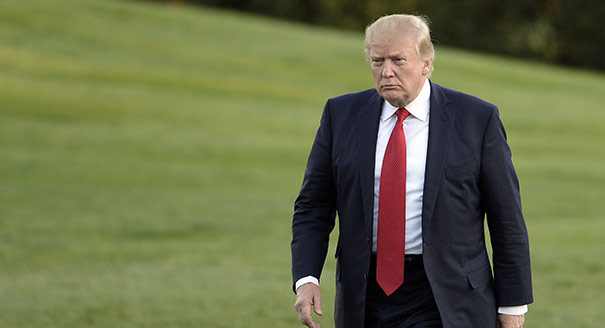Arms supplies from Russia to Iran will not only continue, but could grow significantly if Russia gets the opportunity.
Nikita Smagin
{
"authors": [
"Richard Sokolsky",
"Aaron David Miller"
],
"type": "legacyinthemedia",
"centerAffiliationAll": "",
"centers": [
"Carnegie Endowment for International Peace",
"Carnegie China",
"Malcolm H. Kerr Carnegie Middle East Center"
],
"collections": [],
"englishNewsletterAll": "",
"nonEnglishNewsletterAll": "",
"primaryCenter": "Carnegie Endowment for International Peace",
"programAffiliation": "",
"programs": [],
"projects": [],
"regions": [
"North America",
"United States",
"Middle East",
"Iran",
"Syria",
"East Asia",
"North Korea"
],
"topics": [
"Foreign Policy",
"Security"
]
}
Source: Getty
The common thread in U.S. strategy toward Iran, Syria, and North Korea isn’t changing these regimes so much as it is trying to change their behavior. More than likely, they will all remain hostile to U.S. interests.
Source: CNN
In 2002, George W. Bush identified his now famous "axis of evil" -- Iraq, Iran and North Korea, three rogue, even pariah, states that challenged the international order with terror and weapons of mass destruction (WMD). And he vowed they would not be permitted to threaten the US with the world's most destructive weapons.
That didn't work out so well. The US invaded Iraq and dispatched the cruel and evil Saddam Hussein but at terrible price, leaving Iraq as a highly dysfunctional state and the US engaged in a war it's still waging 15 years later. Meanwhile, Iran and North Korea only grew stronger, ramping up both their nuclear and ballistic missile programs. Indeed, it was the Obama administration's resort to sanctions and diplomacy, not the threat of war, that produced an agreement that has temporarily restrained Iran's nuclear program.
Now under Donald Trump's administration, the "axis of evil" is back, though in somewhat altered form.
Recently Iran, North Korea and Syria (replacing Iraq) have joined ISIS as the administration's key bogeymen. Indeed, in the space of 10 days, Mr. Trump ordered a missile strike on Syria; directed a carrier battle group to the Korean Peninsula; ordered a review of US policy toward Iran that had a threatening edge; and ratcheted up the rhetoric toward North Korea, implying a greater willingness to use force to deal with its missile and nuclear programs.
But like Mr. Bush, Mr. Trump may find his trio of designated outliers difficult to contain -- and sanctions and military pressure necessary but insufficient tools for the job. The task at hand will also require politics and diplomacy. And while each case is different, the common thread in the strategy isn't changing these regimes so much as it is trying to change their behavior -- and even this will be hard to do. More than likely, they will all remain hostile to American interests.
The belief that the threat of military strikes and sanctions will force North Korea to give up its nuclear weapons is magical thinking. The North sees the United States as an existential threat to its survival and nuclear weapons as the ultimate deterrent to US (and South Korean) efforts to topple the Kim regime.
China views the stability of North Korea and its survival as an independent state as a critical national security interest. Vice President Mike Pence's notion that North Korea can be made to give up its nuclear weapons without negotiations is even more fantastical. And anybody who believes that regime change is a viable option is delusional, unless there is a coup among the North Korean elite.
Sooner or later, the Trump administration will face the unpalatable reality that if it can't bomb because of the risks of a disastrous North Korean strike against Seoul and it won't negotiate because it doesn't want to appear weak, the North Korean nuclear stockpile will grow and it will eventually have the capability to hit the United States with nuclear weapons.
The only option worth testing, drawing on some lessons from the Iran agreement, is negotiations that would freeze nuclear and missile testing, roll back North Korea's WMD programs, and ban North Korean exports of nuclear material and technology. But at the end of the day, like it or not, the Trump administration may well find itself directly or indirectly dealing with and acquiescing in the survival of the very odious North Korean regime.
In the wake of the Assad regime's use of chemical weapons against civilians, no less than three US Cabinet officials called for Assad's removal and the President himself described Bashar al-Assad as an animal and an evil man when only days before the administration sounded like it had accepted his staying in power.
What the administration intends to do about Syria isn't clear. The rationale for the missile strikes focused exclusively on the need to punish and deter the use of chemical weapons. If the administration wants to bring about peaceful regime change it will need to use greater military force to prompt the Russians and Iranians to press Assad to the table to negotiate the end of his rule. Such a policy (however unlikely) could trigger a direct conflict with Russia and it certainly would spark a US-Iranian-Russian proxy war in Syria, where Washington lacks the allies on the ground to fight successfully.
It's even hard to imagine a realistic scenario in which some US-Russia deal removes Assad from power. More likely, Assad will remain in power controlling part of a decentralized Syria, and the country will remain unstable as long as he remains part of the equation. In the end, the politically incorrect fact is that the Trump administration may have no choice but to accept that reality.
Last week, at a hastily arranged press event at the State Department, Secretary of State Rex Tillerson ratcheted up administration rhetoric against Iran, accusing Tehran of "alarming ongoing provocations." And even though the State Department had certified that Iran was in compliance with the 2015 nuclear accord, the secretary described the agreement as a failure.
Part of the schizoid rhetoric was apparently driven by the need to offset the kosher seal of approval the administration had just bestowed upon Iran -- and to signal to Israel, Congress, and the mullahs that the administration isn't going soft on Tehran and that it plans to be a tough enforcer and hold Iran to account.
The administration has already put Iran "on notice," imposed more sanctions, and ramped up its support for the Saudi campaign against the Houthis in Yemen -- deemed to be proxies for Iran's interests there.
But there appears to be no concerted campaign yet to challenge Iran in Iraq, the Gulf or directly in Syria. The 90-day review of the nuclear agreement could conceivably call for renegotiating or abrogating it. But what would replace it? And unless Tehran violated the agreement in some major way, the administration would likely lose international support for sanctions, push Iran to ramp up its nuclear program, and risk an eventual Israeli or American strike. At a time when Washington is trying to defeat ISIS in Syria and Iraq, why would the administration want to wrestle with Iran, whose assets on the ground far outweigh our own?
More than likely, much as with Syria and North Korea, the administration is stuck pursuing an approach toward Iran that may contain some of its bad behavior in the region even while it continues to adhere to a nuclear accord it promised to scuttle.
But the "axis of evil" looks like it's here to stay.

Nonresident Senior Fellow, Russia and Eurasia Program
Richard Sokolsky is a nonresident senior fellow in Carnegie’s Russia and Eurasia Program. His work focuses on U.S. policy toward Russia in the wake of the Ukraine crisis.

Senior Fellow, American Statecraft Program
Aaron David Miller is a senior fellow at the Carnegie Endowment for International Peace, focusing on U.S. foreign policy.
Carnegie does not take institutional positions on public policy issues; the views represented herein are those of the author(s) and do not necessarily reflect the views of Carnegie, its staff, or its trustees.
Arms supplies from Russia to Iran will not only continue, but could grow significantly if Russia gets the opportunity.

Nikita Smagin
On the fourth anniversary of Russia’s full-scale invasion, Carnegie experts discuss the war’s impacts and what might come next.



Eric Ciaramella, Aaron David Miller, Alexandra Prokopenko, …
New data from the 2026 Indian American Attitudes Survey show that Democratic support has not fully rebounded from 2020.


Sumitra Badrinathan, Devesh Kapur, Andy Robaina, …
France and Germany’s failure to agree on the Future Combat Air System (FCAS) raises questions about European defense. Amid industrial rivalries and competing strategic cultures, what does the future of European military industrial projects look like?

Rym Momtaz, ed.
Putin is stalling, waiting for a breakthrough on the front lines or a grand bargain in which Trump will give him something more than Ukraine in exchange for concessions on Ukraine. And if that doesn’t happen, the conflict could be expanded beyond Ukraine.

Alexander Baunov